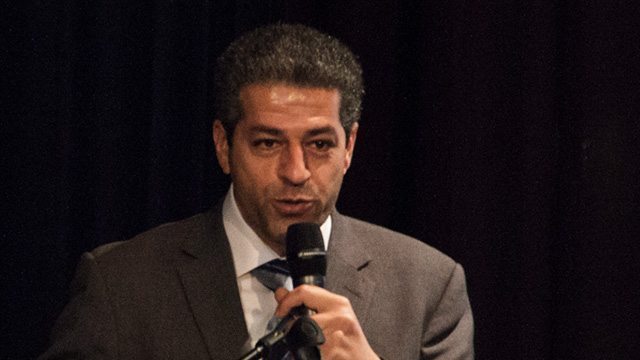Nov. 25—A Schiller Institute team visited Portugal and Spain from Nov. 12-20 to present the new SI report “The New Silk Road Becomes the World Land-Bridge, A Shared Future for Humanity; Vol. II”—the Schiller Institute’s overall strategic vision, and concretely Lyndon LaRouche’s policy solutions to the global crisis. The visit intersected animated policy discussion in both countries preparatory to the visit of Chinese President Xi Jinping to Spain on Nov. 28-29, immediately prior to the G-20 meeting in Buenos Aires, and to Portugal on Dec. 4-5.
Reflecting the activities of the Schiller Institute organizers in Portugal, the Macauhub.com economic website, established by the Macau Special Administrative Region to report on China’s economic and trade ties to Portuguese-speaking countries, on Nov. 19 prominently covered the new SI report under the headline “Iberian Peninsula Can Be `Bridge’ of the Belt and Road Strategy for Africa and Latin America.”
Macauhub reported that, “according to a new study that was recently released,” the “New Silk Road Becomes the World Land-Bridge: A Shared Future for Mankind,” the Iberian Peninsula “could become a bridge for the Belt and Road strategy to reach Africa and Latin America, with a `critical point’ in the Portuguese port of Sines, south of Lisbon.” The new report, issued by the Schiller Institute, which “is led by Helga and Lyndon LaRouche,” … details “20 of the most pressing development projects on the agenda for the coming decades,” Macauhub noted.
Pointing to Spain’s and Portugal’s growing interest in the Belt and Road Initiative, it added that, in the last year, the two nations have “been actively working on specific proposals and projects to make this prospect a reality.”
Macauhub quoted more extensively from the report, and explained that the Spanish port of Algeciras, and the Portuguese port of Sines, are two of the “critical points” for the interface between the Silk Road Economic Belt with the Maritime Silk Road “which will extend to the West, across the Atlantic, to Ibero-America, the Caribbean and the United States as well as south toward Africa.” (See, “Iberian Peninsula can be “bridge” of the Belt and Road strategy for Africa and Latin America“)
As for Spain, the Schiller team found in its discussions with people in Valencia, a port city which is being transformed by its role as one of the top Mediterranean ports for the Belt and Road, as well as in Spain’s capital, Madrid, that intense organizing is underway in Spain to link up with the New Silk Road. What was exciting was to find that discussion is going on not only on how Spain’s internal development can benefit through participating in the Belt and Road, but also on the potential for jointly developing Northern Africa, in particular.
The Nov. 20 presentation at Madrid’s Club Siglo XXI by the 82-year-old head of Spain’s Cátedra China think-tank, Marcelo Muñoz exemplified the discussions taking place in Spain preparatory to President Xi’s visit. Muñoz presented the new world order emerging under the Belt and Road Initiative to a packed audience of 150 top Spanish and foreign diplomats (including China’s ambassador to Spain), businessmen, trade unionists, and sinologists. Joining Muñoz on the panel were two former Spanish ambassadors to China. Two representatives of the international Schiller Institute, Dennis and Gretchen Small. were also present in the audience and participated in the Q&A session.
Muñoz gave an extensive, well-documented review of the phenomenal advances of China over recent decades in all areas of domestic and international economics, in which he emphasized China’s commitment to innovation, technological advance, scientific activity, and global cooperation with other nations. The highlight of his remarks was a discussion of how the New Silk Road is creating the new world of the 21st century, which he illustrated with the signature World Land-Bridge map from the
Schiller Institute’s new Special Report (without identifying the source). He highlighted four projects: the Bering Strait tunnel; the Kra Canal; the Darien Gap; and the Gibraltar Strait tunnel –with the latter receiving enthusiastic support in further discussion from the floor.
Concern over the direction of China policy under Trump, and how to ensure no conflict ensues between the US and China, was a major element of the presentations by Muñoz and the other panelists. Spain’s three-time ambassador to China Eugenio Bregolat stated that there are both sane voices in and around the administration and also hawkish ones (mentioning trade advisor Peter Navarro by name). He counterposed the U.S. reaction to China’s development today, to how the United States under John F. Kennedy responded “confidently” to the Sputnik shock, by leap-frogging ahead in science and technology of its own. America should do the same today, Bregolat emphasized, and not try to stop China’s progress.
The last written question chosen to be answered was that of Dennis Small, on the Schiller Institute’s commitment to getting the United States on board with the New Silk Road and how the speakers thought win-win cooperation in that regard would work. The question as read addressed the question of the U.S. role in the New Silk Road, although not mentioning the Schiller Institute.
Both Muñoz and Bregolat agreed that such cooperation is the solution; America should join with confidence. Munoz emphasized the common basis for cooperation which lies in the realm of scientific cooperation, noting that Confucian philosophy is critical to that common endeavor.


















